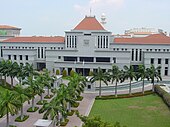| Criminal Law (Temporary Provisions) Act 1955 | |
|---|---|
 | |
| Parliament of Singapore | |
| |
| Citation | Ordinance No. 26 of 1955, now Criminal Law (Temporary Provisions) Act 1955 (2020 Revised Edition) |
| Enacted by | Legislative Assembly of Singapore |
| Enacted | 22 September 1955 |
| Commenced | 21 October 1955 |
| Legislative history | |
| Introduced by | Chief Secretary William Allmond Codrington Goode |
| Introduced | 31 August 1955 |
| First reading | 18 August 1955 |
| Second reading | 22 September 1955 |
| Third reading | 22 September 1955 |
| Status: In force | |
The Criminal Law (Temporary Provisions) Act 1955 (often known by the abbreviation "CLTPA") is a Singapore statute that, among other things, allows the executive branch of the Government of Singapore to order that suspected criminals be detained without trial. It was introduced in 1955 during the colonial era and intended to be a temporary measure, but has since been renewed continuously; the Government has declined to make it permanent, claiming it "believe[s] that the Act should be explicitly extended by Parliament every five years".[1] The validity of the Act was most recently extended in February 2018, and it will remain in force till October 2024.
According to the Government, the Act is only used as a last resort when a serious crime has been committed and a court prosecution is not possible because witnesses are unwilling or afraid to testify in court. The Act is used largely in cases relating to secret societies, drug trafficking and loansharking; in 2016, out of a total of 109 detainees, 91 were detained for secret society activities, 12 for unlicensed moneylending and 5 for drug trafficking.[2]
Part V of the Act provides that whenever the Minister for Home Affairs is satisfied that a person, whether at large or in custody, "has been associated with activities of a criminal nature",[3] the Minister may order that the person be detained for any period not exceeding 12 months if he is satisfied that such detention is necessary "in the interests of public safety, peace and good order";[3] or order that the person be subject to police supervision for any period not exceeding three years. Such "activities of a criminal nature" include secret society involvement, gang activities, drug trafficking, unlicensed moneylending, human trafficking, robbery with firearms, murder, gang rape, kidnapping, and any organised crime activity as defined in section 48(1) of the Organised Crime Act.[4]
Within 28 days of a detention order being made, the Minister must refer the order and a statement of the grounds upon which the order was made to an advisory committee; such advisory committees are, since March 2018, chaired by sitting Judges of the Supreme Court.[2] The advisory committee must submit a written report on the making of the order, with recommendations as it thinks fit, to the President of Singapore, who may cancel or confirm the order. The President may, from time to time, extend the validity of any detention order for periods not exceeding 12 months at any one time, and may at any time refer any such orders for further consideration by an advisory committee. Between 2008 and 2012, the average number of detention orders issued each year was 43, and as of 31 October 2013 there were 209 people detained under the CLTPA; this had fallen to 109 in 2016.
Part II of the Act contains criminal offences designed to prevent supplies from falling into the hands of persons who intend or are about to act or have recently acted in a manner prejudicial to public safety or the maintenance of public order in Singapore, and the creation or possession of subversive documents. Part III prohibits strikes and lock-outs in the electricity, gas and water service industries. It also renders illegal such actions taken in respect of other essential services unless 14 days' notice has been given, or during the course of proceedings taken to resolve trade disputes. Part IV contains various general provisions, including provisions empowering the police to disperse assemblies; carry out searches; and take photographs, finger impressions and body samples from persons arrested, detained or subject to police supervision.
- ^ K Shanmugam (Minister for Law and Home Affairs), speech during the Second Reading of the Criminal Law (Temporary Provisions) (Amendment) Bill, Singapore Parliamentary Debates, Official Report (6 February 2018), vol. 94, no column numbers assigned yet: "[T]he Government has to come to Parliament once every five years to renew the Act. There have been calls in the past to make the Act permanent but we believe that the Act should be explicitly extended by Parliament every five years." The Act was renewed for the 14th time by the Criminal Law (Temporary Provisions) (Amendment) Act 2018.
- ^ a b Ong, Justin (6 February 2018). "Parliament extends legislation allowing for detention without trial". Channel Newsasia. Archived from the original on 6 February 2018. Retrieved 2 January 2021.
- ^ a b Cite error: The named reference
:1was invoked but never defined (see the help page). - ^ CLTPA, Fourth Schedule (inserted in 2018).
© MMXXIII Rich X Search. We shall prevail. All rights reserved. Rich X Search
